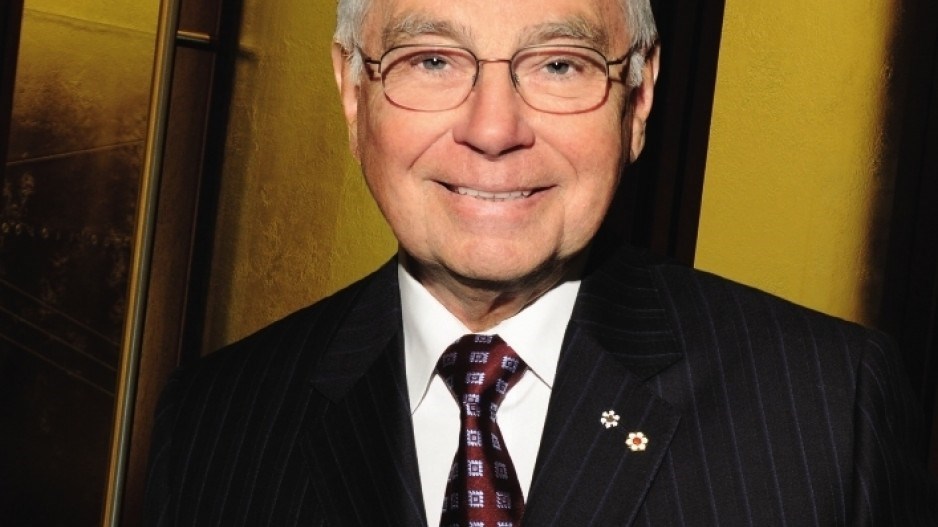When retired senator Ross Fitzpatrick asked Telus (TSX:T) chairman Brian Canfield which resort he and his wife like to stay at when vacationing in California, Fitzpatrick was initially taken aback to learn that they stay in a fifth-wheel in an RV park.
Mobile homes and RV parks seem such a plebeian pursuit for the chairman of a $10 billion company.
"But when you stop and think of Brian and who he is, it really exemplifies what he is and where he came from and the fact he's never forgotten it," Fitzpatrick told Business in Vancouver.
Praised by his peers for his modesty, Canfield said he and his wife prefer the simple social pleasures of an RV park to the silos of a luxury resort.
"You get a group of people who are social. I'm a person who likes the interaction of people."
"One of the things that impressed me most about Brian is his humility," Jim Pattison, CEO of the Pattison Group, said in a video tribute when the Telecommunications Hall of Fame awarded Canfield the 2011 Canadian Telecom Career Service Award.
"[He's] a hugely successful business leader, and the way he treats people is a great example to all of us [of] the importance of people sensitivity, of which Brian is the absolute leader. He's honest; he's come from the bottom up."
Born and raised in New Westminster, Canfield literally started on the bottom career rung of the local phone company that he helped build into a national telecom.
"One of the things that served me well was having walked on both sides of the street," the 72-year-old Order of Canada recipient told BIV.
"I did have an understanding of what it was like on the union side of things. I was even shop steward in the union."
Canfield was recruited directly out of high school in 1956 at the age of 17 to write an exam for BC Tel, and when he finished school he went straight to work as an equipment installer for the company. His wage: $8.15 a day.
BC Tel was overhauling the provincial phone system, as it moved from hand-cranked phones patched through by operators to dial phones and automated switching.
In 1965, Canfield entered a four-year guild program. He worked days and studied at night, but ended up skipping the program's fourth year and entered the BC Institute of Technology (BCIT) to study finance, then switched to economics.
He didn't secure a degree because BC Tel wanted him in management.
However, BCIT ended up giving him an honorary doctorate in 1997.
Canfield's move up the corporate ladder resulted from his willingness to embrace change, and the company's ability to groom and maintain talent from within the organization.
Although he had plenty of offers, Canfield was never tempted to work for any other company – something Canfield attributes to BC Tel's culture of keeping employees engaged by moving those who excelled in one area into other areas.
In 1985, Canfield was promoted to vice-president and then to CEO 1990.
With the advent of the mobile phone and the Internet, the next decade would bring about a seismic shift for the entire telecommunications industry.
"Technology is an enabler, at the same time as it's a change agent," Canfield said.
"We were in businesses that I would never personally have dreamt that we'd ever be in."
As CEO, Canfield insisted on adding transparency to the company's corporate culture. In the mid-1990s, he started holding corporate town hall meetings linked to various locations within the company through fibre optic video links.
"I would start out with a recital of the things I thought were important, then I would take the questions, and I would say there's no question that's off the table," Canfield said.
"If there was anything that came out of that, it was the confirmation of my suspicion that the way we communicated wasn't adequate in the past."
He added that getting employees to buy into a company's strategy, especially in times of rapid change, requires that they fully understand the issues.
"You have to be open and upfront with everybody. I don't think there's any room in a company to have hidden agendas."
Canfield stepped down as CEO in 1997 but stayed on as chairman – a position he has held since 1993.
Two years later, BC Tel merged with Alberta telecom Telus. Canfield remained chairman of the newly formed regional company.
He also stepped in as interim CEO in 1999 after the new one left because of a difference of opinion on the new company's direction.
While Canfield was acting CEO, Telus bought Quebec Tel. Telus was no longer a regional company; it had become a national telecom.
It subsequently acquired Clearnet Communications, a cellular company, which became Telus Mobility.
Becoming a national carrier gave the company the customer base and the research and development capacity it needed to continue to keep pace with the seismic changes occurring in telecommunications.
"It didn't take much to imagine that scale and scope was going to be a major issue," Canfield said.
"You could take the R&D that any one company would do and you could spread it over your base of customers."
In 2000, Darren Entwistle was hired as the new Telus CEO, and Canfield resumed his duties as a non-executive chairman. Canfield ascribes much of the company's success over the past decade to the company's executive team under Entwistle.
"While I am proud to say that our board has been involved and supportive of these accomplishments, it's truly the work of our team members and customers who have made this success possible," Canfield said.
In addition to chairing Telus' board of directors, Canfield has served as a director of Suncor Energy Inc., Terasen Inc. and the Toronto Stock Exchange. For his contributions to business in B.C. and Canada, he has received the Order of British Columbia (1998) and the Order of Canada (2006). •




